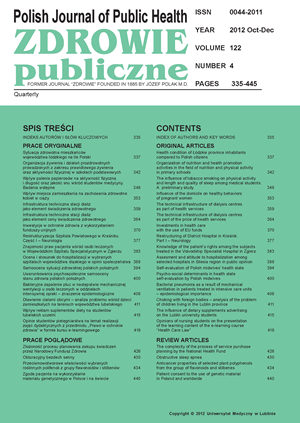Psycho-social determinants in health state self-evaluation by Polish midwives
DOI:
https://doi.org/10.12923/j.0044-2011/122-4/a.12Keywords:
midwives, self-evaluation of health, sense of coherence, social supportAbstract
Introduction. Professional work could be the source of life satisfaction, it could enhance the psychophysical condition. However it happens that professional activity brings negative effects and might be very aggravating.
Aim. The work aimed at assessing psycho-social determinants in health self-evaluation by Polish midwives.
Materials and method. The investigation was performed by means of the diagnostic polling method, using the questionnaire polls, and involved 3569 midwives from all regions of Poland. The method made use of the Polish adaptation of the Sense of Coherence Questionnaire SOC-29, a questionnaire poll for measuring sources of support, as well as a personal questionnaire to describe socio-demographic characteristics of the group.
Results. Midwives who evaluated their mental health state as very good hardly ever or very rarely experienced difficult situations that triggered stress in their personal and professional lives (p=0.0000). In difficult situations, they always received support from their friends (p=0.001), their family (p=0.0024), their colleagues (p=0.0081), as well as from their superiors (p=0.0004). They also enjoyed a high global level of the sense of coherence (p=0.0000).
Conclusions. Good self-evaluation of the investigated midwives was positively correlated with a high sense of coherence. There was also noted a correlation between very good and good self-evaluation of health state and support received from family, friends, colleagues and superiors.
References
1. Antonovsky A. Poczucie koherencji jako determinanta zdrowia. In: I. Heszen-Niejodek, H. Sęk (ed). Psychologia zdrowia. Warszawa: Wyd. Naukowe PWN; 1997. p.206-31.
2. Hobfoll S. Social and psychological resources and adaptation. Rev Gen Psychol. 2002;6(4):302-24.
3. Sęk H. Rola wsparcia społecznego w sytuacjach stresu życiowego. O dopasowaniu wsparcia do wydarzeń stresowych. In: H. Sęk, R. Cieślak (ed). Wsparcie społeczne, stres i zdrowie. Warszawa: Wydawnictwo Naukowe PWN; 2005. p.49-67.
4. Strümpfer DJ, Gouws JF, Viviers MR. Antonovsky’s Sense of Coherence Scale related to negative and positive affectivity. Eur J Personality. 1998;12:457-80.
5. Eriksson M, Lindström B. Validity of Antonovsky’s Sense of Coherence Scale – a systematic review. J Epidemiol Community Health. 2005;59: 460-6.
6. Larsson G, Kallenberg KO. Sense of coherence, socioeconomic conditions and health. Interrelationships in a nation-wide Swedish sample. Eur J Public Health. 1996;6:175-80.
7. Motyka M. Koncepcja salutogenetyczna A. Antonovsky’ego z perspektywy psychologii zdrowia. Pielęgniarstwo XXI wieku. 2005;3: 39-42.
8. Waszkowska M, Dudek B. Poczucie koherencji a zdrowotne następstwa stresu zawodowego. In: H. Sęk, T. Pasikowski (ed). Zdrowie – stres – zasoby, o znaczeniu poczucia koherencji dla zdrowia. Poznań: Wyd. Fundacji Humaniora; 2001.p.203-12.
9. Andruszkiewicz A. Poczucie koherencji pielęgniarek a wzór zachowań związanych z pracą. Rozprawa doktorska. Bydgoszcz: Akademia Medyczna im. L. Rydygiera Wydział Lekarski; 2003.
10. Bień A, Wrońska I, Iwanowicz-Palus G. Poczucie koherencji a zapotrzebowanie na wsparcie emocjonalne u ciężarnych hospitalizowanych w oddziałach patologii ciąży. Ann Univ Mariae Curie-Sklodowska. 2004; 59:157-63.
11. Skirka N. The relationship of hardiness, sense of coherence, sports participation, and gender to perceived stress and psychological symptoms among college students. J Sports Med Phys Fitness. 2000;40:63-70.
12. von Bothmer M, Fridlund B. Self-rated health among university students in relation to sense of coherence and other personality traits. Scand J Caring Sci. 2003;17(4):347-57.
13. Iwanowicz-Palus G, Kicia M, Makara-Studzińska M. Przyczyny i objawy zespołu wypalenia zawodowego. In: M. Makara-Studzińska, G. Iwanowicz-Palus (ed). Psychologia w położnictwie i ginekologii. Warszawa: PZWL; 2009. p.53-7.
14. Bargiel-Matusiewicz K. Wsparcie społeczne a poziom lęku u chorób chorych na AIDS. Wiad Lek. 2001;54:462-71.
15. Knoll N, Schwarzem R. Prawdziwych przyjaciół… Wsparcie społeczne, stres, choroba i śmierć. In: H. Sęk, R. Cieślak (ed). Wsparcie społeczne, stres i zdrowie. Warszawa: Wydawnictwo Naukowe PWN; 2005.p.29-48.
16. Sęk H, Cieślak R. Wsparcie społeczne – sposoby definiowania, rodzaje i źródła wsparcia, wybrane koncepcje teoretyczne. In: H. Sęk, R. Cieślak (ed). Wsparcie społeczne, stres i zdrowie. Warszawa: Wyd. Naukowe PWN; 2005.p.11-28.
17. Pasikowski T. Struktura i funkcje poczucia koherencji: analiza teoretyczna i empiryczna weryfikacja. In: H. Sęk, T. Pasikowski (ed). Zdrowie – stres – zasoby, o znaczeniu poczucia koherencji dla zdrowia. Poznań: Wyd. Fundacji Humaniora, 2001.p.43-55.
18. Gruszczyńska E. Poczucie koherencji a efektywność procesu radzenia sobie ze stresem egzaminacyjnym. In: H. Sęk, T. Pasikowski (ed). Zdrowie – stres – zasoby, o znaczeniu poczucia koherencji dla zdrowia. Poznań: Wyd. Fundacji Humaniora; 2001. p.127-38.
19. Dudek B, Koniarek J. Poczucie koherencji a postrzeganie relacji między warunkami pracy, stresem i samooceną stanu zdrowia. Alkohol i Narkomania. 1996;1(2):65-74.


